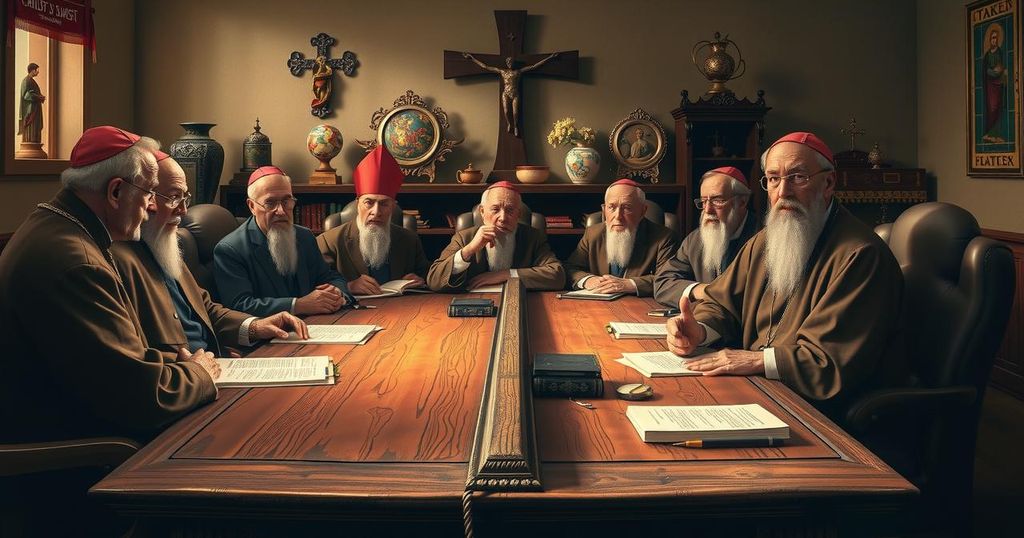Monsignor Donatien Nshole, of the Bishops’ Conference of the DR Congo, was summoned by the government following his warning regarding discrimination against Swahili speakers after M23 rebels took over Bukavu. His discussions with the Interior Minister focused on allegations of violence and the need for evidence. While some perceive this as intimidation against Nshole, others view it as a necessary governmental response amid rising tensions in the country.
Monsignor Donatien Nshole, the secretary general of the Bishops’ Conference of the Democratic Republic of the Congo (CENCO), was summoned by the government following his warning about discrimination against Swahili speakers. This situation arose after the M23 rebels captured Bukavu. On March 6, Monsignor Nshole was questioned at the Ministry of the Interior regarding a statement from CENCO that condemned the alleged crackdown on Swahili speakers in various parts of the country, particularly Kinshasa.
During his meeting with Congolese Interior Minister Jacquemain Shabani, Monsignor Nshole characterized the discussion as an exchange of “very valuable information” regarding the country’s ongoing crisis. The minister’s summons aimed to gather evidence supporting allegations of discrimination and violence against citizens based on language or ethnicity. CENCO’s statement, issued on February 22, indicated the rising danger against Swahili speakers in light of President Félix Tshisekedi’s accusations against his predecessor, Joseph Kabila.
CENCO highlighted a troubling trend of violence correlating with linguistic identity in the aftermath of Bukavu’s fall to M23 rebels. In their statement, they called for government accountability in protecting citizens and maintaining societal harmony. Minister Shabani later requested Monsignor Nshole to provide specifics regarding the alleged incidents, including victim identities and locations. After their meeting, Monsignor Nshole reflected that progress had been made in clarifying the situation.
Minister Shabani responded to CENCO’s concerns by minimizing the events as isolated incidents, asserting that the government had already addressed many of the issues raised. He emphasized the need for any future allegations to be presented to his department before going public, to avoid producing panic and aiding adversaries of the state.
Political sociologist Prof. Tony Kanyinda viewed the government’s actions as sensible, suggesting that CENCO’s significant complaints warranted attention from the Interior Ministry. He noted that if the summons had originated in the judiciary, it could be perceived as harassment, characterizing the government’s approach as constructive amidst ongoing conflict.
Conversely, some Congolese perceive the summoning as an intimidation tactic against Monsignor Nshole, who has played a key role in promoting the Social Pact for Peace and Coexistence. This initiative, backed by CENCO and the Church of Christ in Congo, advocates dialogue with M23, an approach that the government regards with skepticism, given its firm stance against negotiations with rebel factions. Recent communication from government officials indicates an openness to engage with Christian leaders for dialogue with political actors involved in the conflict.
Meanwhile, clashes have intensified in early March between the Congolese Armed Forces and M23 rebels, reportedly supported by the Rwandan army, particularly in the Masisi territory of North Kivu. Civil society organizations are reporting significant civilian casualties and mass displacements as a result of these ongoing conflicts, further complicating the humanitarian situation in the region.
In summary, Monsignor Donatien Nshole’s summons by the Congolese government underscores the sensitive dynamics surrounding language and ethnicity in the current political climate. His warnings about the discrimination of Swahili speakers highlight a broader crisis, exacerbated by conflict and societal tensions. As violence escalates in North Kivu, the roles of religious institutions and government responses remain critical in navigating the challenges of peace and social cohesion in the Democratic Republic of the Congo.
Original Source: international.la-croix.com




